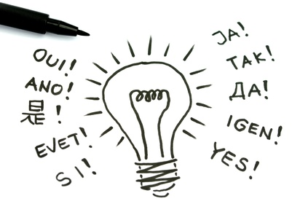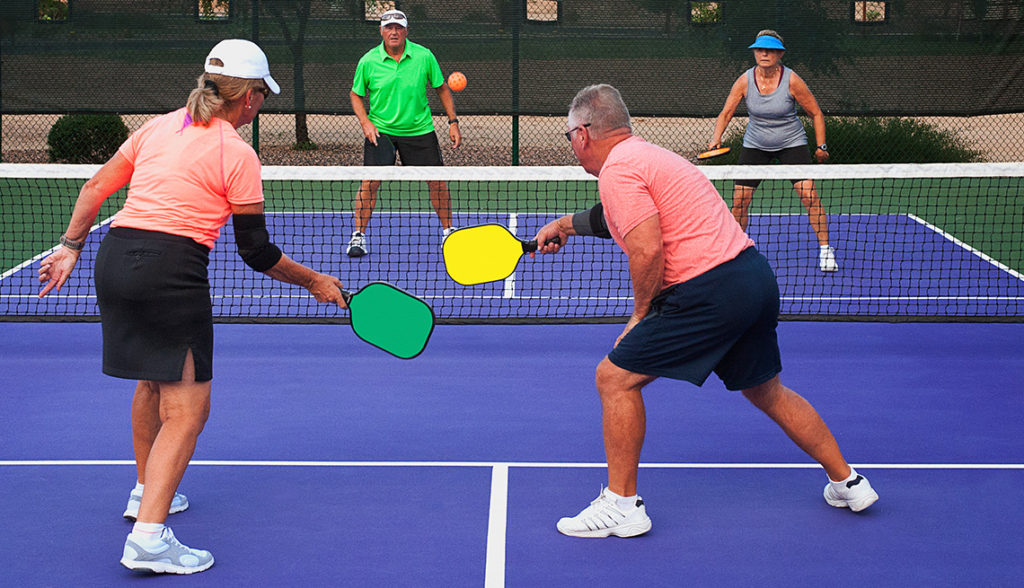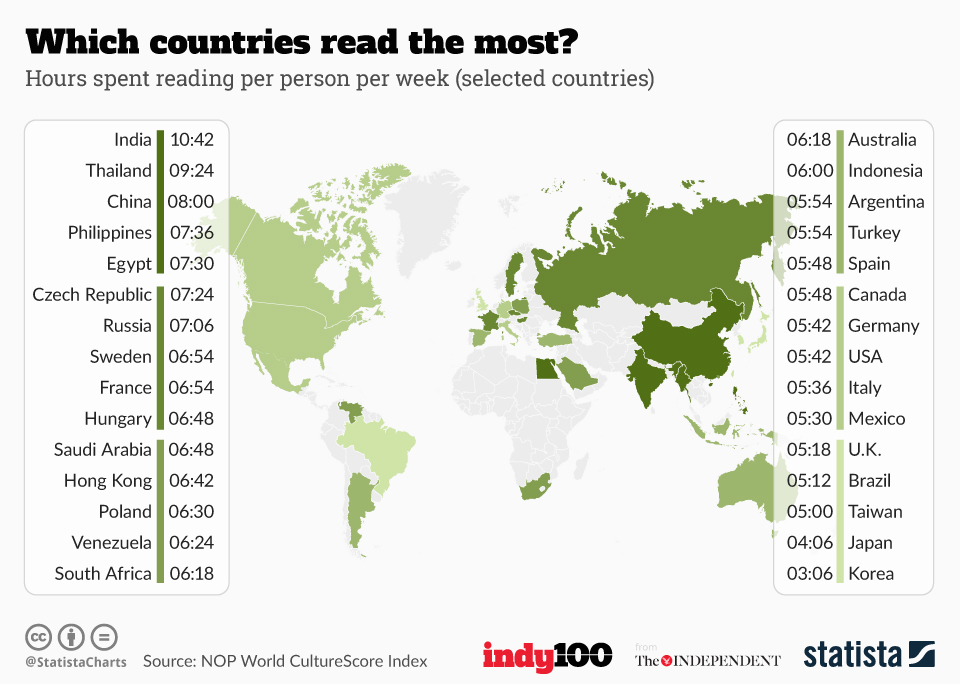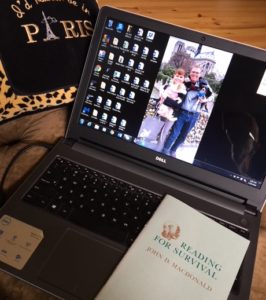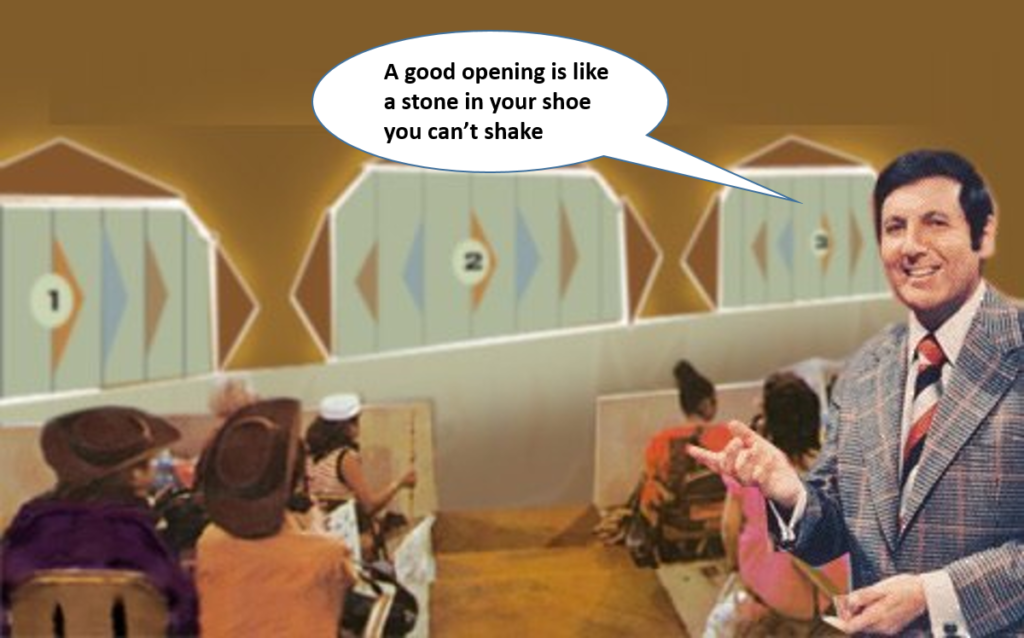We’re off to faraway places with strange sounding names today with our First Page Critique submission. So we have a great chance here to talk about how to handle weird words, foreign languages, things the average reader might not know and how you, the writer, have to work hard to make them get it. I call this, when I talk about this inn workshops, writing for Ms. Peabody in Peoria. Here’s our submission. Thank you, writer!
To Catch a Thief
Air horn blasting, two young men on a Bullet bike tore through lunchtime Mumbai traffic. The one riding pillion turned to his left and hollered, “Hoy, hoy. Katak maal[1].”
Seema squeaked, barely avoiding having her foot run over. She dropped to the tarred road next to the driver’s side door of the taxi halted in front of the high-rise. “Aey, rund—[2]” Gritting her teeth, she swallowed the gaali[3]. If she could, she would’ve chased after them and shoved her elbow into his puny chest. Unfortunately, she was forced to stay put.
Head kept low, she squinted through the tinted windows of the vehicle at the group by the entrance to the building. Her bulky, black purse was on the ground, an inch from her sandal, but she maintained her firm grip on the straps.
“Arrey[4], madam, get up,” exclaimed the cabbie. “Are you crazy or what? You can’t sit on the street. Some poor fool will hit you and have his license taken away.”
And the last memory she took with her to afterlife would be that of the biker Romeos. Not to mention the heat radiating up from the asphalt and the exhaust fumes headed straight for her nostrils. Her eyes teared.
“Gimme my fifty bucks,” the cabbie continued.
“In a minute,” Seema muttered. If she paid now, the taxi would take off, leaving her exposed.
“You said that five minutes bac— That’s it. You now owe me two hundred.”
“What?”
“Waiting charge.”
Baring her teeth, Seema hissed. “Son of a—”
“Madam,” said the cabbie, shaking a finger. “Watch your language.”
Heaving in an angry breath, Seema said, “Fine. But if you’re charging me extra to wait, I’m waiting inside.”
Without delay, she tugged open the back door and scrambled in. Keeping the purse aside, she peered at the entrance to the office building. Damn. The old fellow was still there, with his entourage.
And so was the tall, leanly muscled man in the light blue shirt and red, power tie. Adhith Verma, the assistant manager at the office where she was currently assigned. Clean-cut good looks, a degree from one of the nation’s elite engineering colleges, family money. The silver-haired gentleman with him was his father, the nation’s finance minister.
When Seema returned from lunch, she hadn’t been expecting to run into the minister. She didn’t want to meet him. If Adhith introduced her as anything other than a colleague, the old man would have her investigated. The whole plan could fall apart.
[1] “Hey, hey. Hot piece of ***.”
[2] “You, son of a whore” is what she’s about to say (incomplete here)
[3] Cuss word
[4] “Hey…”
________________________________________
Okay, I’m back. First, let’s tackle the obvious here. We know from the first paragraph where we are — smack in the middle of simmering Mumbai, India. Kudos, writer, for slipping that in nicely. But we are also smack in the middle of a problem — how to convey foreign language without confusing or annoying our readers. Although there are places other like Effortless English that might be able to help non-native English speakers to learn how to speak English fluently there is still a problem that all writers face.
All writers have problems with this. I polled my fellow contributors here at TKZ and they have some solid ideas on how to handle this. More on that in a sec, but first let’s look at the sample:
In the first graph we get this phrase: Hoy, hoy. Katak maal! Then a response from the woman Seema: “Aey, rund—” The problem, of course, is that most readers won’t have a clue what this means. There is no translation, no context. I wanted to like this submission because it does start out fast and furious and I’ve been to India and the Mumbai setting has great potential to lure me in. But I couldn’t get past the foreign phrases, especially in the crucial opening moments. It stopped me cold.
The writer compounds this problem by using footnotes. If this were in book form, the reader could, it appears, look down to the bottom of each page to find out what the characters are saying. But do you really want to make them do this?
Your first job as a novelist is to parachute your reader into a conjured world. Whether this world is Mumbai or Montana is irrelevant. You want them to be swept into your story and setting. Forcing them to pause and essentially go “look up” a word jerks them right out of that imagination stream you are trying so hard to immerse them in. This is just my opinion here, but I found this off-putting. A novel isn’t a thesis. It is a seduction. Why would you want to interrupt the mood and the motion?
But, but…
Yeah, yeah, I know. Mark Haddon’s The Curious Incident of the Dog in the Night-Time. Nabokov’s Pale Fire. Coleridge’s Rime of the Ancient Mariner. And David Foster Wallace’s, Infinite Jest!. Hundreds of footnotes in Jest, in very small type, that go on for almost a hundred pages at the end of the book. One of the footnotes, which contains the complete filmography of a fictional filmmaker, goes on for more than eight pages and itself has six footnotes. Someday, I going to try to read this book…again.
Here’s the thing: These authors are juggling with chainsaws, masters of the grand experiment. Now, I’m not suggesting a “mere” mystery or thriller writer can’t push the envelope. But I think it’s good to keep in mind that novelists who use footnotes are sometimes seen as show boaters. I can’t remember who said it in reviewing Wallace, but he compared him to a writer suddenly leaping into your room through a window and dancing around waving his arms, shouting “look at me! LOOK AT ME!”
I don’t think that is what is going on with our submitting writer here. I think he or she just wasn’t quite sure how to organically fold the foreign words into the narrative. Maybe we can help.
But before I go into that in depth, I’d like to do a quick line edit for the writer. As always, these are only my suggestions for edits. I hope others will weigh in. And thank you, writer, for letting us learn.
To Catch a Thief (Hitchcock got there first. Given your colorful locale, you can find a more evocative title)
Air horn blasting, two young men on a Bullet bike tore through lunchtime Mumbai traffic. Good job telling us where we are. The one riding pillion turned to his left and hollered, “Hoy, hoy. Katak maal.”Vivid image here, but these kids aren’t important. Why give them the opening moment?
Seema You’ve shifted point of view here. Open with her, not the boys squeaked, barely avoiding having her foot run over. She dropped to the tarred road next to the driver’s side door of the taxi halted in front of the high-rise. Simplify your phrasing: She dropped to the asphalt behind the taxi door. (we safely assume it’s parked). “Aey, rund—” Gritting her teeth, she swallowed the gaali. This word is confusing, needlessly so. If she could, she would’ve chased after them and shoved her elbow into his them and his don’t agree. puny chest. Unfortunately, she was forced to stay put. Why “unfortunately?” I assume it’s because she is doing some kind of surveillance? If so, why even start out with the motor bike incident? Get right to the point — the surveillance. I know you’re trying to convey the flavor of your interesting location but there are other ways. She could be hiding behind a bazaar-like stall that line Mumbai’s streets, which are, by the way, head-ache-inducing, teeming with motor bikes, auto-rickshaws, old buses, and yes…cows. And the miasma of smells and noise is amazing. A quick vivid description of this would underline Seem’a tension.
Head kept low, she squinted through the tinted windows of the vehicle at the group by the entrance to the building. Her bulky, black purse was on the ground, an inch from her sandal, but she maintained her firm grip on the straps. You need to be clearer on your choreography here. Was she hiding behind the parked taxi? Had she been in it and got out? Why even have the exchange with the taxi driver? What does it add? Again, you can handle this in fewer words: She peered through the taxi’s windows, watching the group of men at the entrance of the office building. (we don’t care about her purse or shoes.)
“Arrey, madam, get up,” exclaimed the cabbie. “Are you crazy or what? You can’t sit on the street. Some poor fool will hit you and have his license taken away.” I would lose this guy. He’s in the way of your story getting going. And you need to begin setting your plot up — who is this woman and what is she doing?
And the last memory she took with her to afterlife would be that of the biker Romeos. From what I can gather, they were verbally assaulting her, no? Mistreatment (public rape) of women in India is really a hot topic right now in news. Not to mention the heat radiating up from the asphalt and the exhaust fumes headed straight for her nostrils. Her eyes teared. This implies girly-girly reaction. Not sure this is what you want here. Or is she reacting to the smell? Unclear.
“Gimme my fifty bucks,” here, you can safely use “rupees.” He wouldn’t ask for dollars. the cabbie continued. Why is he asking for money? Was she a fare and jumped out?
“In a minute,” Seema muttered. If she paid now, the taxi would take off, leaving her exposed. It would be pretty easy to hide somewhere else on a crowded Mumbai street.
“You said that five minutes bac— That’s it. You now owe me two hundred.”
“What?”
“Waiting charge.”
Baring her teeth, Seema hissed. “Son of a—”
“Madam,” said the cabbie, shaking a finger. “Watch your language.” I would lose all of this and get into your story. It is wasted dialogue. Dialogue is precious. Use it only to advance plot or illuminate character. And unless the cabbie is important, don’t let him hog the scene.
Heaving in an angry breath, Seema said, “Fine. But if you’re charging me extra to wait, I’m waiting inside.”
Without delay, she tugged open the back door and scrambled in. Keeping the purse aside, she peered at the entrance to the office building. Damn. The old fellow was still there, with his entourage. Why didn’t she just wait in the cab to begin with?
And so was the tall, leanly muscled man in the light blue shirt and red, power tie. Adhith Verma, the assistant manager at the office where she was currently assigned. Lost opportunity here to tell me what she does. And why she is watching these men. Clean-cut good looks, a degree from one of the nation’s elite engineering colleges, Be specific when you can. It took me one Google to find out Indian Institute of Technology is Mumbai’s top school. family money. The silver-haired gentleman with him was his father, the nation’s finance minister. This belongs up where you first mentioned him.
When Seema returned from lunch, she hadn’t been expecting to run into the minister. She didn’t want to meet him. If Adhith introduced her as anything other than a colleague, the old man would have her investigated. The whole plan could fall apart. This really needs context. Without telling us what Seema does for a living, why would we care that she’s sneaking around watching this old guy? We need more meat. So my final suggestion, dear writer, is to jettison the cabbie, the biker, and use your first 400 words to get your plot moving forward, more firmly establishing Seema and setting up her conflict
So, to sum up quickly, writer: Love your location! I like Seema, what little I know of her. Yes, it is hard in only 400 words to give us a sense of your setting, protag and the conflict! Which is why I questioned spending so many words on the cabbie. Find a quicker way into your story and I think you’ll be on your way.
Now, let’s take a deep dive into the problem of incorporating foreign language…
With fiction, you almost can’t avoid the occasional use of non-English. It’s a must with world-scale thrillers. Even if you’re working domestically, our increasingly diverse populace puts our characters in constant contact with all sorts of languages and cultures. Indeed, our heroes and heroines might well be héroes or heroínas. You want to be authentic, but you don’t want to confuse your readers. So what’s the poor writer to do?
- Put the language in as it would naturally appear in dialogue and hope the reader can figure it out via context? Creo que eso solo confundiría a los lectores. ¿No estás de acuerdo? (I’m purposely trying to annoy you here).
- Put it the foreign words and then immediately translate them? Mais cela peut sembler si prétentieux et ça fait monter le nombre de mots. But that can seem pretentious and it makes your word count go up.
- Or do you just tell the reader the characters aren’t speaking English, write it in English, and move on?
Every writer handles it in his or her own way. I polled our TKZ contributors and here’s their takes:
John Gilstrap just plain avoid foreign words. “Those words stop the story for the reader, I think,” he says. “In Final Target, for example, virtually all of the dialog is in Spanish, because that’s the nationality of the kids being rescued. So, I handle it like this:
“Who are all these people?” Jonathan asked in Spanish. He was fluent in the language, though aware that he had a distinctly Colombian accent, tied to the days when he was the point of Uncle Sam’s spear.
“After that, I write as I normally would. And once I’ve established the model of English-as-Spanish, it would be jarring to throw in a Spanish word.”
Makes sense, n’est-ce pas? Because, as John says, his entire plot hinges on Spanish-speaking kids, so if he toggled back and forth between two languages, it would get old fast.
But sometimes, you have to include foreign phrases to convey verisimilitude. I love this word because it really means something more than mere realism. In fiction it means creating an entire atmosphere that imitates life. Even if the story is far-fetched (fantasy), readers must be willing to suspend disbelief and think that the story could actually occur. In sci-fi, readers will tolerate the “foreign language” of complex science terminology if the writer is skillful at contextualizing it.
I think the same rule applies for foreign languages. I like to insert it in my books because, used judiciously, it helps place the readers into the conjured world. But man, you really have to careful.
Unless you’re a native speaker, get help! Jordan Dane often uses Hispanic characters because, as she says, she’s “part Hispanic, and I get friends and my father to help with get the language and the slang right, depending on the perceived education of the Spanish speaker.” She always italicizes the Spanish and tries to explain the meaning directly after the language change. But at times, she leaves it to the reader to figure things out by body language or by the flow of conversation. Here’s one of Jordan’s scenes with her series character, Ryker Townsend, an FBI profiler with psychic abilities who speaks fluent Spanish. In this scene, he is questioning a girl who was smuggled over the Mexican border and left in a sweltering truck to die of heatstroke.
“Amelia? Can you open your eyes, Miss Tejeda?” She raised her voice and leaned over the bed rail.
The Hispanic girl’s eyes fluttered as she struggled to wake up. When her dark eyes opened, she gripped the metal bed rail and pushed back from Lucinda, terrified as if she were still in the hands of her abductors. When her eyes noticed the nurse and the hospital setting, she spoke in Spanish in a fragile voice.
“Yo ne hice nada. No me aresten.”
When Amelia said she had done nothing wrong and pleaded not to be arrested, Lucinda shifted her gaze to me. She didn’t speak the language, but I did.
“¿Por qué te arrestaríamos?” I asked. “Tu no has hecho nada mal.”
Miss Tejeda fixed her pained eyes on me as if I could save her. With shaky fingers, she reached for my hand. I barely sensed her grip. She had no strength left.
“Please help me…find my friend…Fiona.” She strained for every word. “People say…she lived. Her country sent brave men to save her. Is this true? Did she live?”
“Yes. We are leaving soon to find her. How do you know Fiona Storm?”
“She saved my life. I owe her…everything.”
It made no sense that this kidnapped woman had been saved, only to find herself in a worse situation and near death. I wondered if this was the delirium the doctor warned us about.
“Dime. ¿Cómo salvó Fiona tu vida?” I had to know. How could Fiona have saved her life?
This is pretty much how I handle foreign languages with my series character Louis Kincaid. I might put in the foreign phrase, but I provide some method of translation. In the Florida books, I often had him interacting with Spanish-speaking characters. Like Jordan, I would use the actual Spanish but there would always be a secondary character there to translate for him and the reader. In Island of Bones, Louis goes to a migrant camp in search of a missing Mexican girl. Her mother speaks no English and is hostile. But the father speaks enough to translate and tells him that his daughter met a boy shortly before she disappeared.
“She called him a boy, not a man?” Louis asked.
“Yes, a boy. That’s what she said.”
“Did she tell you his name?”
“I do not remember, but I know it was a good Hispanic name.”
“Did she describe him to you?” Louis asked. “Tell you anything about him?”
The man shook his head. “I think she call him…”
He looked to his wife and asked her something in Spanish.
The woman hesitated then whispered two words.
The man turned back to Louis. “She called him Papi chulo.”
“What does that mean?”
“It is something young people say. It means he was handsome, a hunk you would say.”
In my upcoming October release The Damage Done, Louis is hired onto an elite cold case squad and one of the job requirements is to become fluent in a foreign language. Louis, like me, speaks bad college French. Here’s a passage with his new boss, Capt. Steele:
“Louis has been studying to become our in-house expert on unsolved Michigan homicides,” Steele said. He paused with the barest of smiles and added, “Louis has exceptional instincts and a special feel for unsolved cases that you will all come to appreciate.”
Louis held Steele’s hard brown eyes, not happy with the description of his resume. It made his past sound sensational and his investigative skills almost paranormal. That’s the last thing he needed with this group—to be tagged as some sort of celebrity mystic who dug through dusty folders.
“Louis,” Steele said, “Bienvenue chez toi.“
Welcome home? Louis was so surprised it took him a moment to answer. “It’s good to be back,” he said.
So another way to handle foreign words is to have the person who hears it translate it in his head (via italics).
This is how James Scott Bell handles it, agreeing with John’s approach for extended passages. Says Jim: “You can monkey with the diction, too, to give it a ‘formal’ sound in English, as Hemingway does in For Whom the Bell Tolls. For shorter clips, you can have the POV character “hear” the language, like this example from Elmore Leonard’s Cuba Libre:
Now Teo was speaking to Fuentes in Spanish, Tyler getting some of it. It sounded like Teo wanted to ride one of the horses.
Leonard throws in the occasional Spanish word, always putting it in italics:
“You pronounce it pretty good,” Tavalera said, “but the Guardia are not police during time of war. We’re like those people, the caballería, except we don’t stay in Havana and go sightseeing, we hunt insurrectos.“
See the simple beauty of that? The word “guardia” is immediately grasped, as is “caballeria.”. Very graceful!
Or, as Jim points out, you can simply translate, if it’s a one-time exchange:
“Dónde están las armas?” Where are the weapons?
But a more artful way to do this is question and response:
“Dónde están las armas?”
“I have no idea where the weapons are.”
Sometimes, a foreign tongue is, as John Gilstrap pointed out, essential to your plot. For my stand alone The Killing Song, which is set in Paris, I had an amateur sleuth English-only protag and I wanted to stress the fish-out-of-water feeling of anxiety he felt. I had to incorporate French throughout and it had the effect of making him feel confused and frustrated. But you can’t let this go on too long. So I teamed him up with a French detective, so she was always there to help him — and the reader. Plus, the give-and-take of the language barrier became part of their friendship arc. And even though I can speak French, I ran every sentence by a Paris-born French friend, who also helped me with some spicy slang used by les flics (cops).
A couple more thoughts on odd language. I didn’t even get into American dialects with this, especially “Southern speak,” which I have become more attuned to since moving to Tallahassee, where “y’alls” and “ma’ams” rain down harder than afternoon toadstranglers. Maybe the only thing we need to say about regional American dialects is to avoid trying to duplicate them on the page. It gets old really fast. I’d advise writers to say, “he spoke with a Texan twang” or something and trust the reader to get it. For my new book, I have to acknowledge the peculiar accent of Michigan’s Upper Peninsula, as spoken by the “Yoopers.” Here is how Louis hears it:
“Reuben Nurmi. Good to meet ya,” he said in a voice that sounded like it belonged on some late-night jazz station. Except for the distinctive Yooper twang. Louis had always liked the accent , which fell somewhere between the hard nasal vowels of Detroit and the odd lilt of Canada.
Verisimilitude. Which is Latin in origin, by the way. Quae surrexit?

